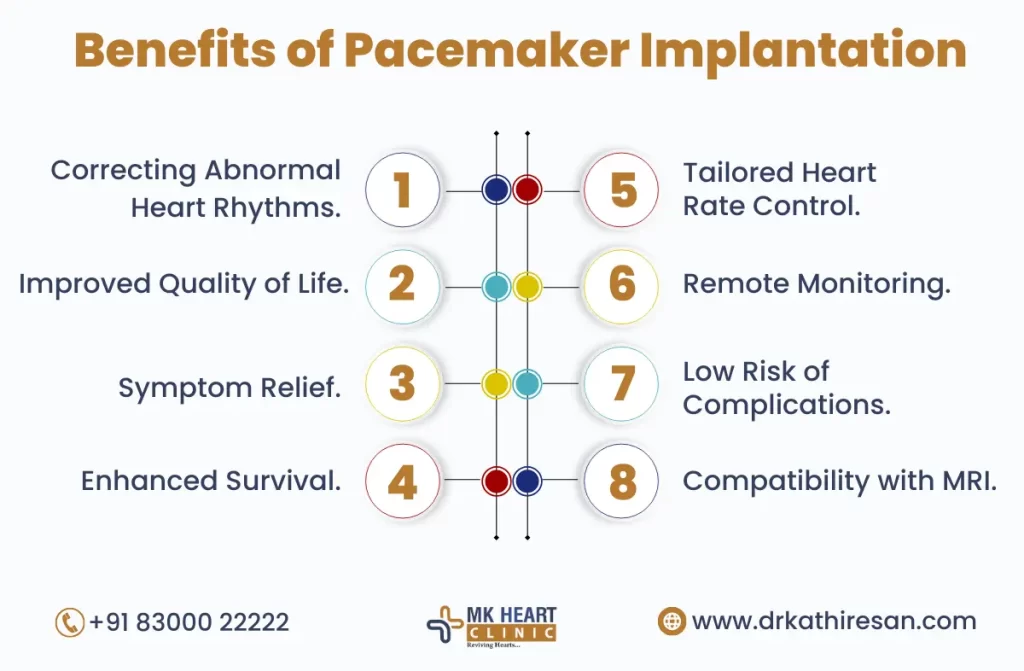If you’re seeking a single chamber pacemaker in Chennai, you can find top-notch medical facilities and experienced cardiologists specializing in cardiac device implantation. MK Heart Clinic offers advanced pacemaker implantation services to ensure the well-being of patients with heart rhythm disorders.
What is Single Chamber Pacemaker Implantation?
A single chamber pacemaker in Chennai, implantation is a medical procedure in which a small electronic device called a pacemaker is implanted in the patient’s heart. The pacemaker is designed to regulate the heart’s rhythm and ensure that it beats at a consistent and appropriate rate. This procedure is typically performed to treat heart rhythm disorders, such as bradycardia, where the heart beats too slowly, and certain types of heart block.

Causes of Single Chamber Pacemaker Implantation
The need for a single chamber pacemaker implantation can arise due to several underlying medical conditions and factors, including:
- Heart Block: A heart block is a condition where there is a disruption in the electrical signals that control the heart’s rhythm. This can lead to slow or irregular heartbeats, which may necessitate a pacemaker to regulate the heart’s electrical activity.
- Aging: As individuals age, the natural electrical system of the heart can deteriorate, leading to heart rhythm disturbances. This age-related deterioration may necessitate the implantation of a pacemaker to maintain a regular heart rate.
- Certain Medications: Some medications can cause bradycardia or heart rhythm disturbances, and a pacemaker may be needed to address these effects.
- Heart Surgery: In some cases, heart surgery or other medical procedures may inadvertently damage the heart’s electrical pathways, requiring the placement of a pacemaker to restore normal heart rhythm.
Who is the Right Doctor for Single Chamber Pacemaker Implantation?
Dr. M. Kathiresan is an eminent electrophysiologist and an ideal choice for single chamber pacemaker implantation. With extensive expertise in diagnosing and treating heart rhythm disorders, Dr. M. Kathiresan possesses the necessary skill and experience to evaluate patients, determine the need for a single chamber pacemaker in Chennai, and expertly perform the implantation procedure.
His knowledge and commitment to cardiac care make him a trusted professional in the field, ensuring that patients receive the highest level of care and precision when it comes to single chamber pacemaker implantation in Chennai.
Treatment for Single Chamber Pacemaker Implantation
The treatment for single chamber pacemaker in Chennai involves several steps:
- Evaluation: The patient is thoroughly evaluated by the electrophysiologist to determine the underlying heart condition and the need for a pacemaker.
- Preparation: Before the procedure, the patient is typically instructed to fast for several hours. The patient is also informed about the pacemaker implantation process and its potential risks and benefits.
- Local Anaesthesia: The implantation procedure is often done under local anaesthesia, and the patient remains awake but numbed to minimize discomfort.
- Pacemaker Placement: A small incision is made near the collarbone, and the pacemaker leads (wires) are threaded through blood vessels to the heart. The pacemaker device is then connected to the leads and placed beneath the skin.
- Testing and Programming: The pacemaker is tested to ensure it functions correctly. The device is also programmed to meet the patient’s specific heart rate requirements.
- Closure: The incision site is closed, and the pacemaker implantation procedure is completed.
Benefits of Single Chamber Pacemaker in Chennai
- Restoration of Normal Heart Rhythm: The primary benefit of a single chamber pacemaker in Chennai is that it helps restore and maintain a regular heart rate, ensuring that the heart efficiently pumps blood and supplies oxygen to the body.
- Improved Quality of Life: Patients who require a pacemaker may experience significant improvement in their symptoms, including fatigue, dizziness, and shortness of breath, leading to an enhanced quality of life.
- Reduced Risk of Complications: By addressing bradycardia and heart block, a single chamber pacemaker in Chennai, they can help to reduce the risk of more severe complications, such as fainting spells or heart failure.
- Long-Term Solution: Pacemakers are designed to provide long-term heart rhythm management, offering patients a reliable and effective solution to heart rhythm disorders.
Risks of Single Chamber Pacemaker Implantation
While single chamber pacemaker implantation is generally a safe and effective procedure, it does come with some associated risks and potential complications. These may include:
- Bleeding: Some bleeding at the incision site can occur.
- Lead Displacement: The leads of the pacemaker may become dislodged or move out of position.
- Device Malfunction: Rarely, the pacemaker device may experience technical issues.
- Allergic Reaction: Some patients may experience an allergic reaction to the materials used in the pacemaker.
Conclusion
Single chamber pacemaker in Chennai is a life-changing medical procedure designed to address heart rhythm disorders such as bradycardia and heart block. This procedure, typically performed by specialized cardiologists known as electrophysiologists, involves the placement of a small electronic device to regulate and maintain a regular heart rate.
Also, Read Different Types of Pacemakers.

